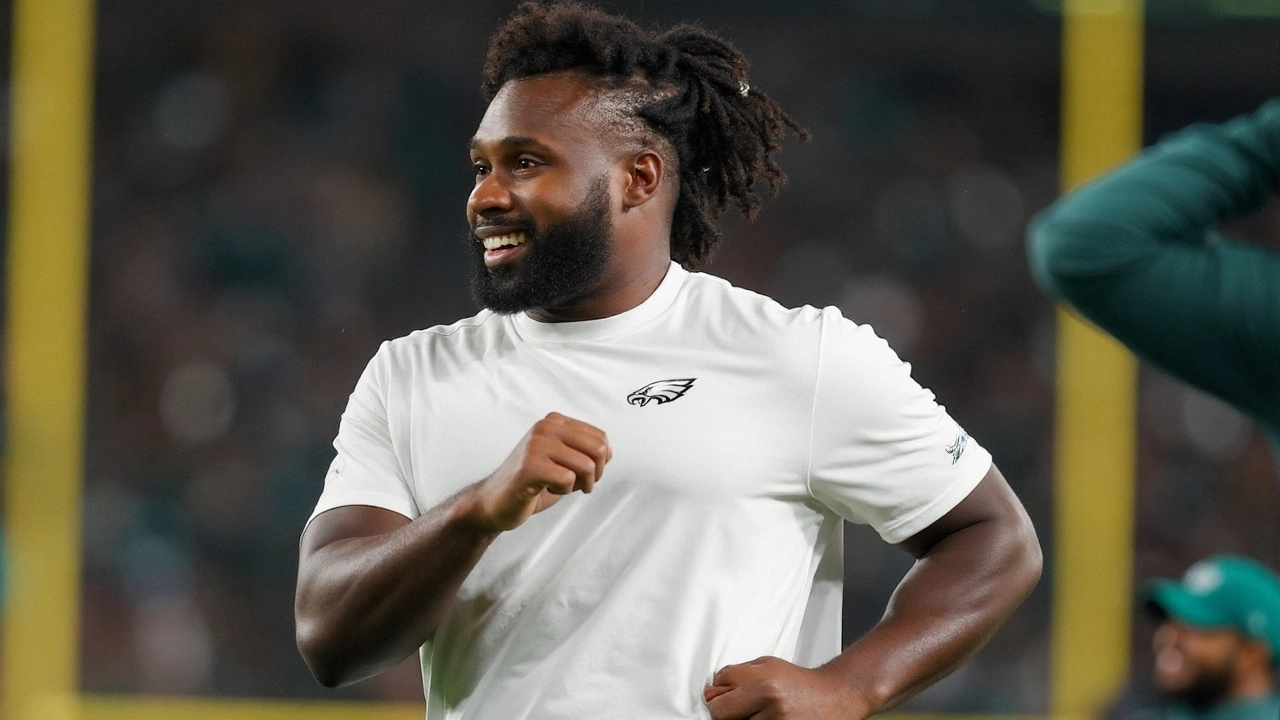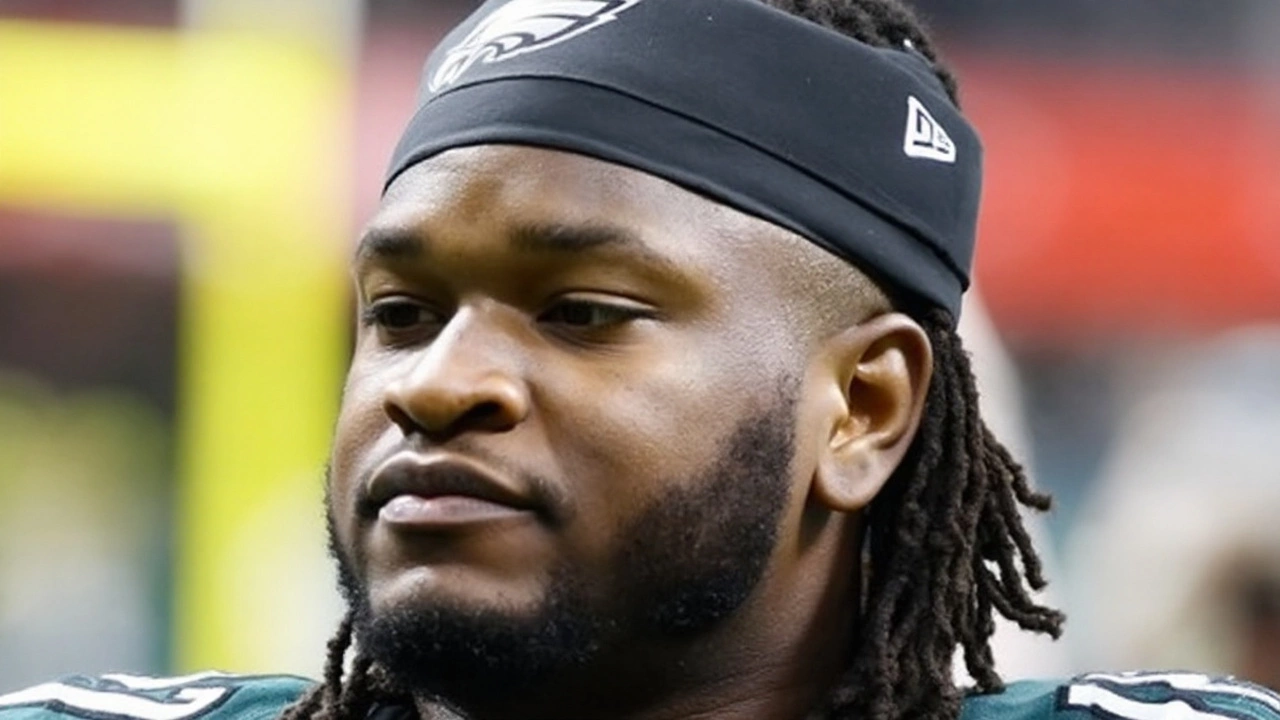Six seconds into the Eagles–Cowboys opener, Jalen Carter was ejected for spitting on Dak Prescott during an injury delay. Prescott had spat forward moments earlier, a routine habit, which Carter appeared to take as a slight. Carter apologized afterward, calling it a mistake. Dallas struck first, but Philadelphia rallied to win 24-20 as the league reviews the incident for potential discipline.

- Created by: Gareth Rubens
- Completed on: 5 Sep 2025
- Categories: Sports
What happened in those six seconds
Six seconds. That is all it took for the NFL’s season opener between Philadelphia and Dallas to detour into chaos. As medical staff tended to Eagles fullback Ben VanSumeren after the kickoff, tempers flared near the line of scrimmage. Philadelphia defensive tackle Jalen Carter and Cowboys quarterback Dak Prescott came face-to-face. As the two separated, cameras caught Carter spitting on Prescott. The flag came out fast, and before the first snap, Carter was ejected for unsportsmanlike conduct.
The moment was jarring because nothing had happened yet, at least in football terms. No plays. No first down. Just an injury stoppage and a rivalry simmering under prime-time lights. The incident unfolded in that dead space, where players often talk, post up, and try to set an early tone. Instead, it set off one of the strangest openings to a high-stakes divisional game in recent memory.
Context matters here. Video angles shared after the game showed Prescott spitting forward earlier during the stoppage, the way many quarterbacks do to clear their mouthguards and dry mouth in huddles. He did it away from his linemen. Carter, who was watching Prescott while also jawing with rookie guard Tyler Booker, appeared to interpret it as a slight in his direction. A handful of frames later, Carter spit toward Prescott. Officials had a clean look and made a swift call to eject.
After the win, Carter owned it. He called it a mistake and said it would not happen again. He sounded shaken by the timing and by how it hurt his team, saying the early exit messed with him emotionally. Prescott’s read was simpler: he said he did not intend to spit on a player and that he often spits ahead during games. Put together, it adds up to a misunderstanding that spiraled into the worst possible outcome for one of the NFL’s top young defenders.
The rulebook leaves little wiggle room. Spitting on an opponent is unsportsmanlike conduct and can be deemed flagrant. Referees have the authority to disqualify a player on the spot if they judge the act crosses that line. That is what happened here. It is rare, but it is not unprecedented. Ejections that early are almost unheard of, though, which explains the shock you saw and heard across broadcasts and social media.
The timing made it sting more for Philadelphia. Carter, 24, is central to the Eagles’ front and was coming off a season with 4.5 sacks and 12 tackles for loss. His job is to wreck pockets and swallow run lanes, especially against a quarterback like Prescott who thrives when the middle of the field is clean. Removing that player before the first play is like taking a queen off the board before move one.

Fallout on the field and in the locker rooms
Dallas immediately tested that gap. Prescott and the Cowboys marched 75 yards in six snaps, finishing with a one-yard run by Javonte Williams. It looked, briefly, like the script had flipped in their favor. But the rest of the night did not follow that opening beat. Philadelphia reshuffled its rotation, leaned on early-down discipline, and clawed back. By the fourth quarter, the Eagles had seized control and held on 24-20.
How did they manage it? Depth up front helped. Philadelphia used heavier fronts and asked more from its edge players to compress the pocket from outside-in. The linebackers tightened up fits and kept Prescott from getting easy completions off play-action. Offensively, the Eagles bought their defense time with longer drives, which mattered after losing a snap-eater like Carter. It was not pretty, but it was sturdy enough to survive a bad start.
The emotions were real on both sidelines. Eagles players were stunned to see a teammate tossed before he could even get his hands in the dirt. Cowboys veterans looked frustrated that a routine sideline habit—spitting forward—could be read as disrespect and explode so fast. Both things can be true at the same time. Misreads happen in rivalry games where everyone is keyed up and every movement looks like a message.
The officiating piece will be debated. Should a ref eject that quickly, or should they issue a penalty and warning first? The letter of the law backs a disqualification when a player spits on an opponent. The officials saw it, they ruled it flagrant, and they acted. The aim is to keep a lid on things before they boil. If you let that go in the first minute, everything after is harder to control. You could see that thinking in the speed of the flag.
There is also the league’s follow-up. The NFL automatically reviews ejections. Fines are common for unsportsmanlike conduct, and the office looks at intent, context, and player history. A suspension is less likely for a first incident of this type, but it is not impossible if the act is judged unusually severe. Expect some form of financial penalty and a warning letter at minimum. Teams generally expect the decision to land midweek after the league’s standard review cycle.
Public reaction tracked the whiplash of the moment. Fans watching at home saw a marquee player tossed almost before the game began and asked the obvious: what just happened? As replays surfaced showing Prescott spitting forward seconds earlier, the narrative shifted from outrage to a messier middle—one player’s routine colliding with another player’s perception. Neither side left happy. The Cowboys felt the referee’s decision gave the Eagles a cause to rally around. The Eagles felt they had to win with one arm tied behind their back.
Inside the locker room, the tone was measured. Carter apologized to teammates and fans and took responsibility. That matters in a veteran room that has heard every excuse in the book. Prescott explained his habit and pushed back on the idea he would spit on an opponent. These are two respected players. A rivalry can hold both respect and edge. Thursday night just found the line the hard way.
There is a human side, too. Players are creatures of routine. Quarterbacks spit to clear saliva and adjust mouthguards. Linemen spit into towels. Defenders talk to fire themselves up. All of that can read very differently in a charged moment, especially when an injury stoppage turns a live game into a long stare-down. The cameras catch it all. The microphones pick up none of it. That is how a misunderstanding can look like malice in a five-second clip.
From a football perspective, the bigger story for Philadelphia is how it adapted without its disruptor. The Eagles used more simulated pressure—showing blitz, then dropping out—and trusted their front four to win honest. They crowded short routes to force Prescott to hold the ball that extra beat. On key downs, Dallas could not run it straight at a thinned interior the way you would expect. Credit to the rotation and the sideline adjustments for steadying the ship.
For Dallas, the opener showed something useful, too. Prescott looked sharp early, and the offense jumped on the Eagles’ sudden vulnerability. But drives stalled when the run game hit third-and-medium and Philadelphia disguised coverage. On a different night, with a cleaner middle pocket, this might have snowballed. Instead, the Cowboys left points out there and let a rival off the hook.
The rivalry layer sits over all of it. Eagles–Cowboys games come with more noise, more cameras, and more edge. Every stare reads louder. Every shove feels heavier. When something as unusual as a six-second ejection happens, it feeds that legend. This one will be remembered not just for the scoreboard, but for the oddity that set it in motion.
Two things can be true about the opening scene. Spitting on an opponent is out of bounds and earned the flag. And a routine act by a quarterback looked like something else to a defender in a heated moment. The NFL will sort the discipline. The teams will adjust for next week. And when these two see each other again later this season, nobody will forget how quickly a game can turn from routine to raw.
As for Carter, the path back is straightforward. Own the mistake, take the fine, and move on. His teammates backed him after the win. His coaches will focus on the tape and the corrections. The Eagles need his force inside. The Cowboys will plan for it next time. And somewhere in all this, both sidelines will likely rethink small habits that can look big when the world is watching.